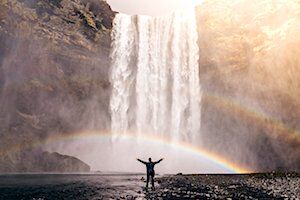Relationships
Change 2020: Choice or Chance?
Better decisions arise from honest personal inquiries.
Posted October 25, 2020

The changes that will occur in the coming weeks will make history in the voting annals of the United States. As I write this, there are still nine days of prologue before the critical enactment scenes begin. Unexpected “by chance” events can still happen: an earthquake or hurricane could interfere with voting or a key player could become critically ill with COVID-19. Hopefully, the more important impacts come “by choice.” Those choices depend on every conscientious voter who participates. This is a time for each of us to reach deep into our own consciousness to make our most informed, truthful, and heartfelt choices—the ones I call our most beautiful.
Given the increased intensity of our recent election communications, imagine metaphorically what the active signals traveling by airwaves and cables might imply about the people sending them. Are diverse airwaves competing in a transmission speed race? Are the cables heating up? Yes! No! Certainly! Never! Truth! Lie! How many signals are malware intruders interrupting? How many signals are shaking between towers from fear of a breakdown?
As usual, we cannot know everything happening around us relative to the voting issues. We may often rely on others to sort through what details are deemed significant. We cannot escape that we must make some choices among ambiguities and opinions rather than verified facts. Opinions are perspectives (such as this essay) that may provide insights into issues for one’s consideration. In that sense, they can be of value. They are likely to contain unequal weights of personal viewpoints and data-supported information. That’s why it is so important to do our best to recognize the differences between opinions and factual information to avoid being deceived. Fact-checking can help resolve inconsistencies.
After we become as honestly informed as possible, the foremost evaluation of the resultant input occurs within our individual minds and hearts. Ultimately, one’s choice is best made by one’s own deepest self. This does not mean simply doing replays of what one has heard from others. It means honestly seeking answers to important questions within oneself. The first choice in making a choice is what question to ask. Are the reasons for my choice really mine or am I mimicking an outsider who has played on my weaknesses? Have I chosen just because a group rally was fun or made me feel momentarily special or powerful? Does my heart feel my choice is one of moral value? Am I embracing love or spewing hate as I decide? Who among our population will my choice help or harm?
Searching honestly inward means being aware of the limitations of one’s perspective and the realities of one’s intentions. It means questioning one’s own prejudices. These can be very difficult tasks. Beautiful choices are not always easy or convenient ones.
There was no way to predict that at this time in our voting history a multitude of events would be happening simultaneously. Many are causing upheaval globally. Examples are the COVID pandemic and climate change. These events impact economies, living conditions, international relationships, supplies of food and goods, etc. As a nation, we face significant challenges that force us to question our behaviors of self-absorption while being urged to expand our awareness to include the wholeness of humanity. Realization of this, too, must be part of our voting “choice” rather than left to “chance.” We must not ignore the potential impact of our votes on our immediate conditions as well as on conditions in the futures of our children.
Any individual choice becomes one in a multitude of choices that will thrust forward the direction of our shared future as a nation and a global participant. This is not a trivial game on a pixeled screen of dragons; it is a matter of life on real Earth. This is not a popularity decision of who becomes high school prom king; it is a matter of who can lead us rationally through difficult, unique challenges for the better good of all. The responsibility that is upon all voters in 2020 seems especially broad and consequential. As such, it may arouse many feelings. Hopefully, one of them is courage.
Being a participant in this voting activity is a time to practice kindness and respect toward each other regardless of personal views, long lines, or attempted intimidation. It is a time to be soft-spoken and patient in our conversations and not arouse anger or violence within ourselves or others. This may seem an unattainable ideal at times but we must try.
To keep it simple, the process is for each voter to mark their private choices and for those choices to be counted honestly. That is the sacrosanct right of each voter in our democracy.
© Betty Luceigh, October 25, 2020


